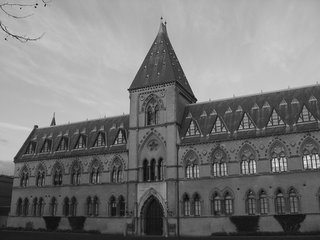
Bicycle shopping today went badly. I tried eBay and Craiglist without finding anything appealing. I also walked to the Oxford Cycle Workshop, on Magdalen Street between Iffley and Cowley, but they don’t have any bicycles in my size available. They did, however, issue the third warning I have received not to buy used bikes from the Cycle King on Cowley Road.
One option that seems as though it might be good are the police auctions that take place from time to time. The Thames Valley Police website doesn’t seem to say anything about them and the best I can find elsewhere is the vague suggestion that they might happen on Wednesdays. I will stop by the station on St. Aldates to ask about them tomorrow.
I do have a bike back in Vancouver, but the difficulty of conveying it here probably means that it’s better to leave it there for now. I got it quite a long time ago, during the summer after my first year at UBC (2002). That is when I was first living in Fairview – working as a cashier at the almost completely empty Pharmasave. I remember biking down to see Jenny and Zandara, when they were living near the Alma Street 7-11, as well as regularly making the 22km trek from UBC to my parents’ house in North Vancouver.
That ride was a really nice one if done properly. You can follow a route parallel to Broadway that is specially marked off for bikes. Alternatively, you can follow the beaches that encircle UBC eastward until you reach the Burrard Street Bridge. From there, you can follow the shoreline past the Aquatic Centre and along the really stunning area near English Bay. It’s especially lovely in the evening. Once you get to Stanley Park, you can follow trails that parallel the causeway, eventually joining it to cross the Lions Gate Bridge into North Vancouver.
The last good bike trip I had in British Columbia is when I went Galiano Island with Tristan and his brother. A few of my photos from the trip are here. I can’t seem to find any of Tristan’s online.
After a couple of years of not riding regularly, I doubt I would be able to climb the hill from Marine Drive in North Vancouver up to my parents’ house. They only live about eighty metres above sea level, but it is a lot harder to push yourself and a bike up that kind of hill than it is to walk up. Of course, such concerns do not exist in Oxford which – for good or ill – barely has a slight slope anywhere in it.
One of the reasons getting a bike would be so nice is that it would let me explore the area beyond Oxford a bit. During the summer, when the days are longer, it would be interesting to visit some of the outlying towns and villages. In general, it would also be good to get some exercise. If nothing else, it might help me sleep.
The bicycle plan, then, has been prioritized and is moving on apace. Hopefully, my mother will be able to bring my helmet, D-Lock, and lights from North Vancouver. Buying them here seems like it would cost seventy Pounds, or more.
- With only a week left in the term, the search for someone to sublet either my room in Wadham or the one I am moving into on Church Walk is becoming pressing. Either is available starting between April 10th and 20th and until June 17th. Anyone interested in more information should email me. The room in Library Court is available to Wadham College students only.
- My new MDR-EX71SL headphones arrived today. Listening to them as I walked up Cowley and down Iffley Road, the sound quality seems to be quite good. Compared to my very similar broken headphones, they seem to put more emphasis on mid-range sounds and accentuate percussion a bit more. In any event, I am happy enough with them, even though they seem to be made from a lower grade of plastic. The original pair lasted about six years before falling apart. We will see how these ones fare.
